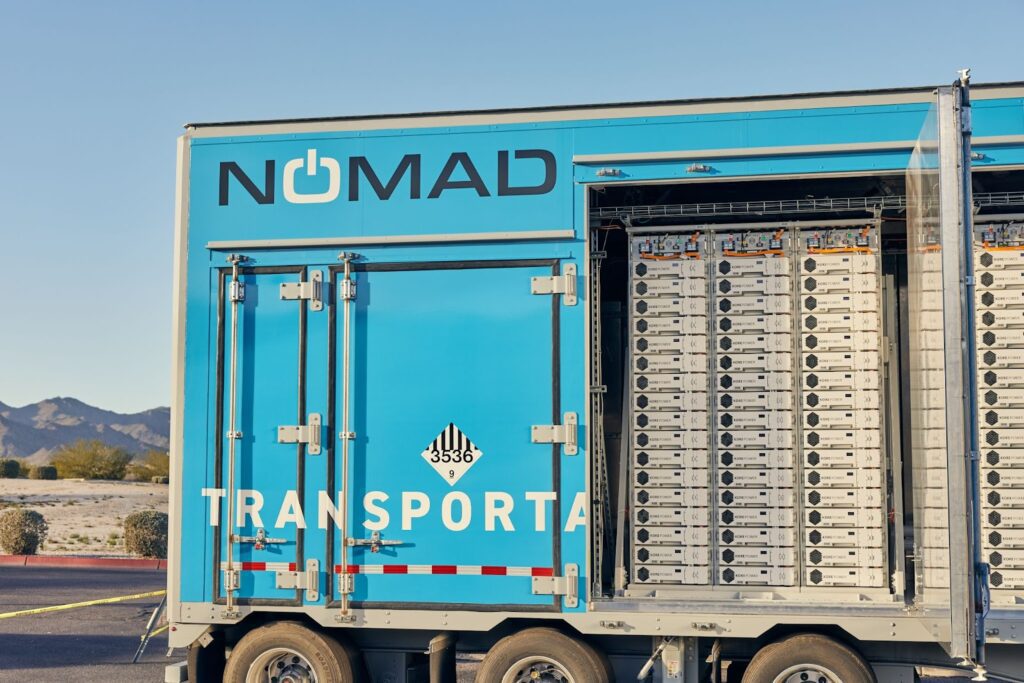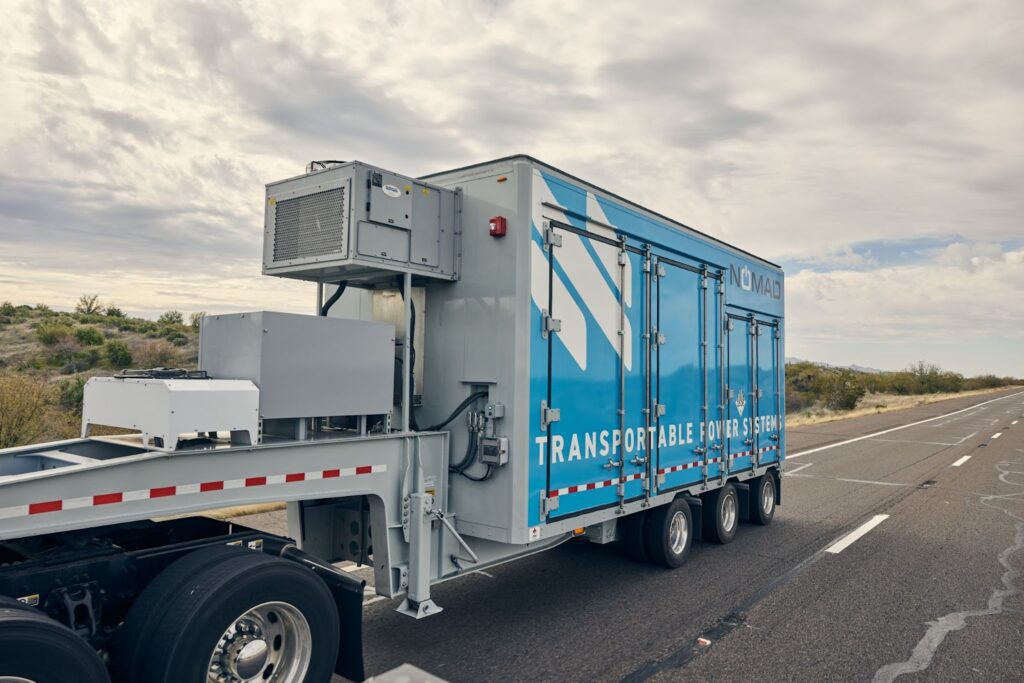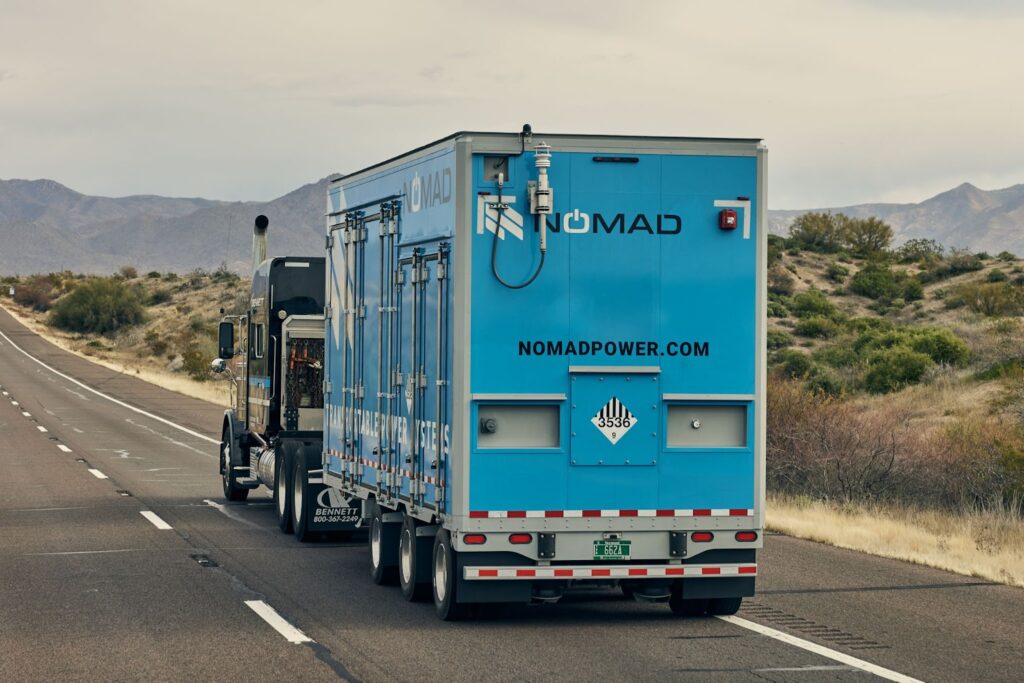The clean energy transition passed another milestone in late 2022 when Nomad Transportable Power Systems (NOMAD) sold the industry’s first portable energy storage unit to Green Mountain Power (GMP), Vermont’s largest utility. With that sale, announced in November, the company became the first to market with a utility-scale mobile power solution.
This kind of mobility is increasingly vital as utilities deal with erratic weather patterns that threaten power supplies. When the grid goes down, mobile energy units can deliver power where it is needed most.

Photo Courtesy Nomad Power
Other utilities have experimented with mobile storage as a disaster-preparedness tool. But the concept never made it past the pilot stage — until NOMAD designed a mobile power-supply trailer that can carry batteries and all the equipment and controls needed to operate a utility-scale grid.
“The product is fully commercialized, and now we’re really expanding the sales and delivering to customers,” Chris McKay, NOMAD general manager, told Canary Media in a recent interview.
NOMAD, headquartered in Waterbury, VT, makes power systems designed to do everything that fixed energy storage can do while also providing mobility.
Unlike fixed-storage operations, the company’s product can be redeployed to meet other needs.

Photo Courtesy Nomad Power
KORE Power, an Idaho-based developer of battery cell technology for the clean energy industry, founded NOMAD. KORE, which also has operations in Waterbury, got the idea for a mobile power system in 2015 when it saw a need to deliver energy based on customers’ needs but with a lower cost of entry and a lower carbon footprint.
Starting in early 2019, KORE established a working partnership for standard employee self-service (ESS) systems manufactured, designed, and operated in the U.S. NOMAD was launched soon after. The company unveiled its portfolio of mobile energy storage units in August 2022 at a ribbon-cutting event in Waterbury. The portfolio included these three models:
- The Traveler, with 2 megawatt hours (MWh) of capacity
- The Voyager, with 1.3 MWh of capacity
- The Rover, with 660 kilowatt hours of capacity
“Our products are mobile, so they can deliver power in a range of applications and speed that stationary energy storage systems can’t match,” said Jay Bellows, NOMAD CEO, in a statement. “Our team identified a need in the market, and using American innovation and New England ingenuity, we’ve been able to deliver a product that will bring benefits across the nation.”
GMP was drawn to NOMAD because its system checked many boxes regarding clean energy, flexibility, resilience, and reliability. The utility bought the 2 MWh model, or roughly the equivalent of the amount of electricity used by about 330 homes in one hour.

Photo Courtesy Nomad Power
“Green Mountain Power is bringing technologies to all of our customers that cut carbon and costs and keep Vermonters powered up,” said Mari McClure, GMP CEO. “Mobile storage paired with our generation will allow us to power our NOMAD — which packs 2.0 MWh of capacity — with clean energy and deploy that power wherever it is needed.”
The utility told Canary Media that it will build a mobile EV charging trailer that connects to the NOMAD battery trailer. The goal is to provide vehicle charging capability during grid outages. The system will also allow commercial customers with big seasonal demand spikes, such as ski resorts and campgrounds, to use the storage during busy seasons.
A few months after the GMP deal was announced, NOMAD revealed that its systems would be part of an Electric Power Research Institute (EPRI) study. It will determine how microgrids and clean energy technologies can benefit National Guard sites by offering energy resilience, cost savings, emissions reductions, and reliability during emergencies.The U.S. Department of Defense’s 2022 Environmental Security Technology Certification Program selected the EPRI project team, including Blue Frontier, ClearFlame Engine Technologies, and Heila Technologies, to deploy integrated microgrid systems at three National Guard sites in Delaware, Mississippi, and Texas.
Check out the episode of the Consensus in Conversation podcast featuring Day Bellows Barron of KORE Power.





